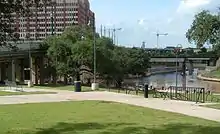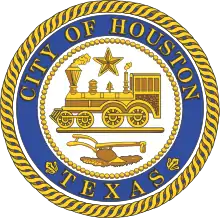First Ward, Houston
The First Ward of Houston, which is located inside the 610 Loop, is one of the city's historic wards. It was originally the center of the business district for the city, and was strategically located at the intersection of Buffalo Bayou and White Oak Bayou, near an area now known as Allen's Landing. It was one of the original four wards in Houston when it was created in 1840. It was defined as all area within the city limits of Houston (which was much smaller at the time) north of Congress Street and west of Main Street.[1]


In 1866 First Ward land to the north and east of White Oak Bayou and Little White Oak Bayou was split off to create part of the Fifth Ward. Just prior to the abolition of the ward system in 1915 the Woodland Heights neighborhood was constructed in what was then the northwest corner of the ward, just north of White Oak Bayou.
In 1987, Kim Cobb of the Houston Chronicle said "It's hard to find any vestige of the old First Ward, since it's covered by downtown office buildings."[2] In 2006, the last remaining houses of a former residential neighborhood were vacated and bulldozed, replaced by the 23-acre (9.3 ha) Sawyer Heights Village, a shopping center that includes a Target.[3] Part of the remaining 19th and 20th century bungalows and cottages was named the High First Ward Historic District in 2014.[4] The rest of the residential sections of the ward have seen construction of numerous lofts and townhomes in the 21st century.
Economy
The ward's economic base was heavily industrial for much of its history, and industrial service companies including Matheson and Tejas Materials still employ hundreds. However, the ward is today primarily known as an arts district, with Spring Street Studios, Winter Street Studios, and Sawyer Yards (converted from a Mahatma Rice facility in 2015) all operating within a few blocks of each other.[5] The aforementioned Sawyer Heights Village shopping center provides the area's commercial anchor.
Government, historical sites, and transportation
Jefferson Davis Hospital was built in the First Ward in 1924. It was built on the site of a former Confederate cemetery, leading to rumors the site was haunted. The hospital building was converted to subsidized housing for artists in 2005, and was designated a historic landmark in 2013.[6][7]
The former Barbara Jordan Post Office, which is currently being redeveloped into a commercial and entertainment hub named Post HTX, is located within the boundaries of the ward. The same site was also home to Houston's Grand Central Station in the early 20th century.[8]
The Houston Fire Department houses fleet maintenance and arson investigation facilities on Dart Street.[9]
Transit includes the Houston Amtrak station near Washington Avenue and five Metro bus routes.
Education
The First Ward is within the Houston Independent School District; the part of the First Ward not within Downtown is zoned to Crockett Elementary School,[10] Hogg Middle School,[11] and Reagan High School.[12]
Hawthorne Elementary School used to serve the First Ward; it opened in 1893, replacing Houston Avenue School (which was later known as the First Ward School), and closed in 1959. Richard Brock Elementary School opened on the former Hawthorne site in 1967. In 2006 it was converted to the Crockett Early Childhood Center.[13] Crockett took the attendance territory formerly held by Brock.[10][14]
The University of Houston–Downtown (UHD) is a four-year state university, located within the historic First Ward. Founded in 1974, it is one of four separate and distinct institutions in the University of Houston System. UHD has an enrollment of 12,900 students—making it the 13th largest public university in Texas and the second-largest university in the Houston area.[15]
Religion
The Roman Catholic Archdiocese of Galveston-Houston operates nearby St. Joseph-St. Stephen Church in the 6th Ward.[16]
St. Stephen Church in the First Ward, which had a congregation with many Mexican immigrants, occupied what Lisa Gray of the Houston Chronicle referred to as "a modest church building" and was in an area experiencing gentrification.[17] It closed in 2016 when it was merged with St. Joseph Church. In 2018,[18] and 2019, there were protests advocating that the archdiocese reopen the church. The leadership of the Catholic church overruled the archdiocese and ordered the church to reopen, but as of 2019 no such reopening has yet occurred.[17]
See also
References
- Plocek, Keith. "How Houston's Neighborhoods Got Their Names." Mentalfloss. Retrieved on September 21, 2016.
- Cobb, Kim. "Move afoot to train Houstonians to erase `ward' from vocabularies." Houston Chronicle. Saturday June 6, 1987. Section 1, Page 27. Retrieved on October 20, 2011.
- Spivak, Todd. "Brave New World: A Heights family is targeted in the name of progress." Houston Press. April 13, 2006. Retrieved on February 12, 2013.
- "High First Ward Historic District established." Houston Archaeological and Historical Commission. Retrieved September 21, 2016.
- Esquer, Nick. "Art on the Rise." Houstonia Magazine. Retrieved September 21, 2016.
- Mulvaney, Erin. "Subsidized lofts let artists 'follow their dreams'." Houston Chronicle. Retrieved September 21, 2016.
- Gonzales, Carolina. "The Haunted Jefferson Davis Hospital". Houston Chronicle. Retrieved September 21, 2016.
- de Luna, Marcy. "Developer has mega mixed-use plans for defunct downtown post office, call it Post HTX". CultureMap. Retrieved September 21, 2016.
- "Contact the Houston Fire Department". Retrieved September 21, 2016.
- "Crockett Elementary School Attendance Zone Archived September 30, 2007, at the Wayback Machine." Houston Independent School District. Retrieved on November 29, 2010.
- "Hogg Middle Attendance Zone Archived February 27, 2009, at the Wayback Machine." Houston Independent School District. Retrieved on November 29, 2010.
- "Reagan High School Attendance Zone Archived February 27, 2009, at the Wayback Machine." Houston Independent School District. Retrieved on November 29, 2010.
- "School Histories: the Stories Behind the Names." Houston Independent School District.
- "Brock EL Boundary Map." Houston Independent School District. April 13, 2002. Retrieved on November 29, 2010.
- "Texas Higher Education Enrollments" (PDF). Texas Higher Education Coordinating Board. Retrieved March 15, 2009.
- "Home". St. Joseph-St. Stephen Church. Retrieved June 2, 2020.
Saint Joseph Catholic Church Historic 6th Ward Houston Texas
- Gray, Lisa (January 14, 2019). "St. Stephen faithful protest to have church reopened". Houston Chronicle. Retrieved June 2, 2020.
St. Stephen,[...] is now surrounded by trendy breweries, art galleries and three-story townhomes.[Referring to gentrification]
- Gray, Lisa (December 24, 2018). "In Houston's gentrifying First Ward, immigrants fight to reopen their church". Houston Chronicle. Retrieved June 2, 2020.
Further reading
- Chapman, Betty Trapp (December 2012). "Houston's First Ward—Producing Food from Farm to Counter" (PDF). Houston History Magazine. 8 (1): 34–37.
- Lord, Sandra. "Take A Walk in Houston's Historic First Ward" (PDF). 3 (2): 72. Cite journal requires
|journal=(help) - Feldman, Claudia. "Houston's First Ward is flourishing, but not without some friction." Houston Chronicle. April 23, 2014.
_Houston.jpg.webp)
